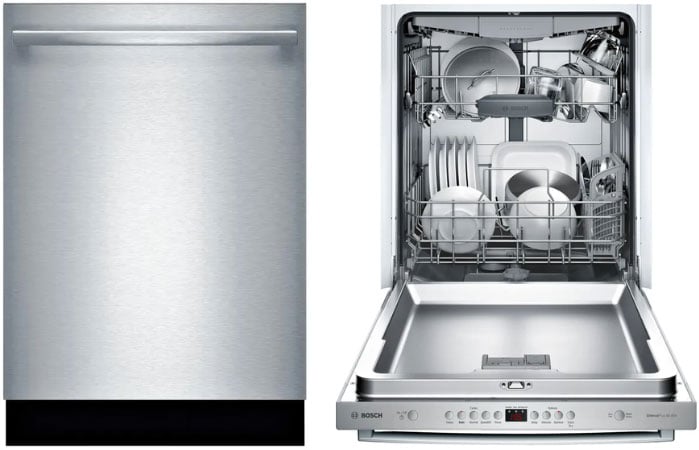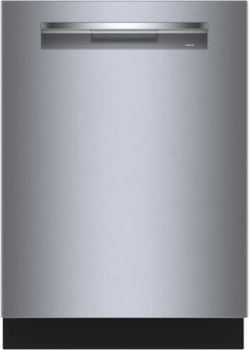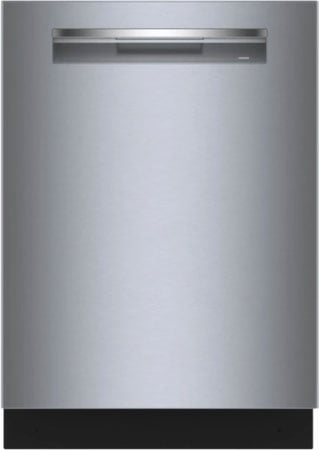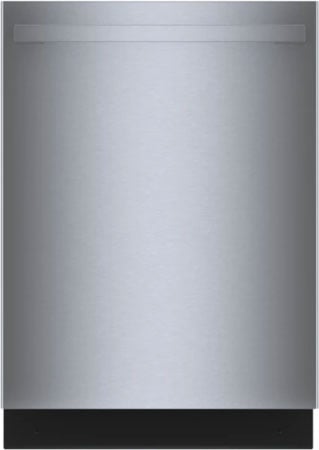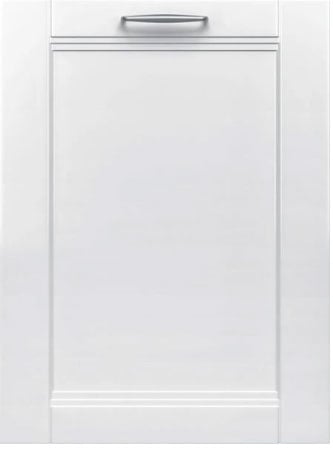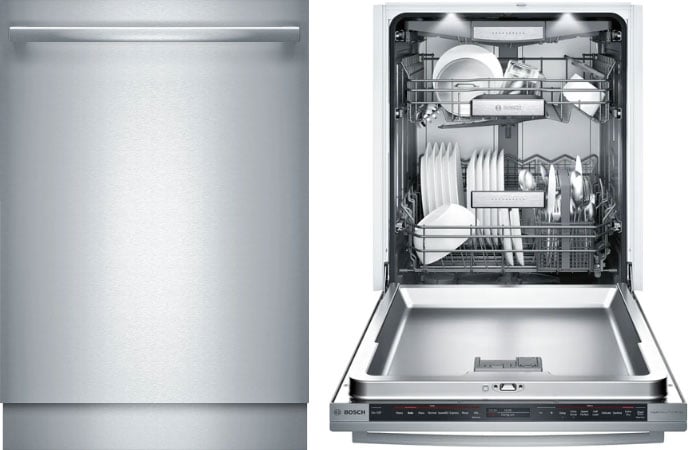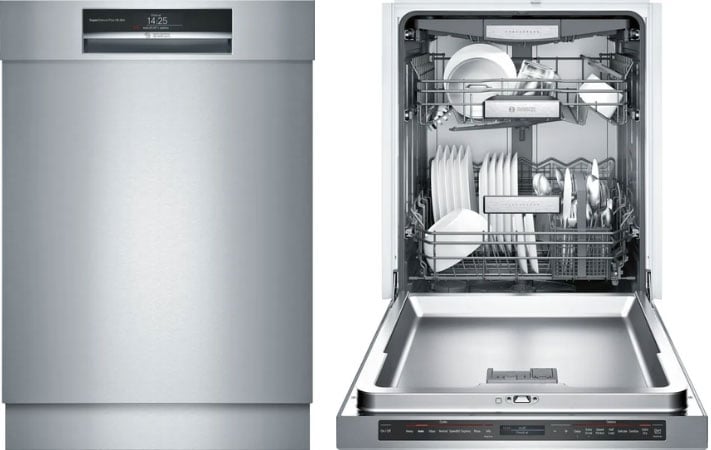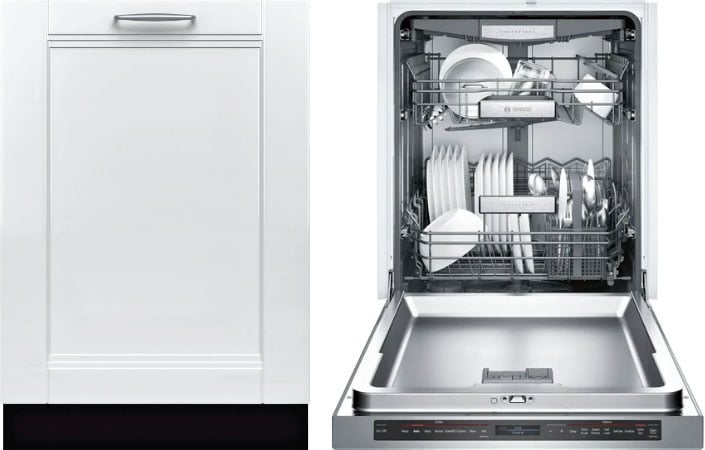The Ultimate Bosch Dishwasher Comparison: 100, 300, 500, 800 & Benchmark Series Explained
July 24th, 2025 | 14 min. read
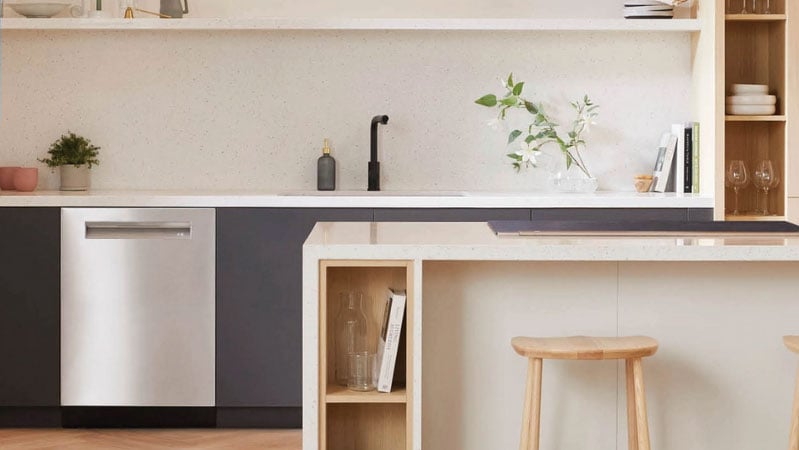
✅Key Takeaway: Bosch makes some of the quietest, best-performing dishwashers in 2025. Choose the 100 Series for basic needs, the 300 or 500 for everyday reliability, the 800 for top-tier drying and features, or Benchmark if you want the most premium feel.
If you’ve shopped for a Bosch dishwasher lately, you’ve probably seen what everyone else sees: a wall of numbers. 100, 300, 500, 800, Benchmark.
What does it all mean, and which one should you buy?
Add in terms like CrystalDry, AquaStop, and decibels, and you’re left nodding politely at the salesperson while secretly Googling under the counter.
I’ll explain every option in plain English.
You’ll see what thousands of local service calls reveal about Bosch reliability, and how to choose the right model for your kitchen and budget.
First tip? If you don’t want to read the whole thing, download our Free Dishwasher Buying Guide. Over a million homeowners already have, and it might just save you from buying the wrong one.
Ready to get clear on Bosch? Let’s do it.
📽️Prefer a video rundown? In this video, you’ll see how Bosch’s 100, 300, 500, 800, and Benchmark Series compare for drying, noise, features, and reliability so you can find the right one for your kitchen fast.
How Reliable Are Dishwashers in 2025?
Quick Answer: Bosch is still a reliable dishwasher brand in 2025, but LG leads with the fewest service calls.
Before you start comparing racks and fancy drying tricks, here’s the question that really matters: Will it break?
At Yale, we keep this honest because we’re the ones showing up to fix it if it does.
Last year, we handled over 33,000 service calls across the region.
Here’s what the real numbers say based on sales divided by service calls:
The following service rates are based on a minimum of 100 products sold and a total sample of over 5,000 products within 12 months.
| Service Rates | |
| LG | 4.7% |
| Thermador | 6.9% |
| KitchenAid | 7.4% |
| Bosch | 9.5% |
| Miele | 10.1% |
| Bosch Benchmark | 10.9% |
| GE Profile | 11.6% |
| Beko | 17.7% |
| Café Appliances | 20.3% |
| Fisher & Paykel | 21.5% |
| Grand Total | 9.9% |
So what does that mean for your kitchen?
👉 LG is the most reliable, with less than 5% of units needing service last year. Bosch lands just below the average—solid, but not flawless.
Some brands like Fisher & Paykel and Café creep higher because they’re newer here and have quirks (and fewer service techs, too).
The kicker? It’s not just how often something breaks.
It’s whether someone will actually fix it where you live.
We service Bosch, LG, Thermador, KitchenAid, Miele, GE Profile, Beko, Café, and Fisher & Paykel throughout Greater Boston, Cape Cod, Southern NH, and Rhode Island.
Service is crucial before buying Bosch or any other brand. Most dealers do not offer it, so make sure you can get your dishwasher fixed in your area.
Installation is another factor. Always Google service and install before you buy.
ℹ️Quick Note on Thermador
You’ll see Thermador in the service numbers too, but here’s the inside scoop:
Thermador dishwashers are made by Bosch and share almost all the same parts and design. The main reason people buy a Thermador dishwasher is that it’s often free when bundled with a Thermador pro range or wall oven.
No cooking bundle? Just choose a Bosch dishwasher. It offers the same quality for a better value.
✅ Bottom Line: Bosch is still a great bet for a quiet, feature‑rich dishwasher with strong local service support. If reliability above all is your priority, put LG at the top of your list.
🔍Read more: Most Reliable Dishwashers
Bosch Dishwasher Series Comparison (2025)
| Tub Composition | Noise Decibels (dB) | Wash Cycles | Rack System | Drying System | Leak Protection | |
| 100 Series | Stainless sides, plastic bottom | 46-50 dB | Auto, Normal, Quick, PowerScrub | Standard racks | Condensation | OverFlow Protection |
| 300 Series | All stainless | 46 dB | Auto, Normal, Heavy, Express, Sanitize, Eco | RackMatic upper rack + 3rd rack | Condensation | AquaStop |
| 500 Series | All stainless | 44 dB | Adds Delicate, Half Load, Favorites | RackMatic + 3rd rack | AutoOpen door | AquaStop |
| 800 Series | All stainless | 39-42 dB | Same as 500 plus Extra Dry, PowerControl zones | MyWay 3rd rack + RackMatic | CrystalDry + AutoOpen | AquaStop |
| Benchmark Series | All stainless | 38-39 dB | Same as 800 | Premium racks with ball bearings | CrystalDry + AutoOpen | AquaStop |
What Makes Each Bosch Dishwasher Series Different?
Quick Answer: Each Bosch series adds upgrades in tub material, noise level, rack flexibility, and drying power, starting with basic features in the 100 Series and ending with premium touches in Benchmark.
- Tub: Stainless holds heat and doesn’t trap odors like plastic.
- Noise: The lower the decibels, the quieter. Below 44 dB is nearly silent.
- Racking: RackMatic means adjustable upper rack. MyWay is a deep third rack for mugs and bowls.
- Drying: Condensation is standard. AutoOpen and CrystalDry help dry plastics better.
- Leak Protection: AquaStop uses sensors to shut off water if there’s a leak.
Do You Really Need the Bosch HomeConnect App?
Quick Answer: You don’t need the HomeConnect app for everyday use, but it unlocks smart features like PowerControl, remote start, and cycle notifications.
Every Bosch dishwasher from the 300 Series up is “smart,” meaning it can connect to Wi-Fi through Bosch’s HomeConnect app.
Yet, you don’t need the app for everyday washing. Just pick your cycle on the machine and hit Start.
But the app does unlock a few extras, like PowerControl (targeted spray power in the 800/Benchmark), custom cycles, push notifications when your cycle’s done, or remote start if you’re out.
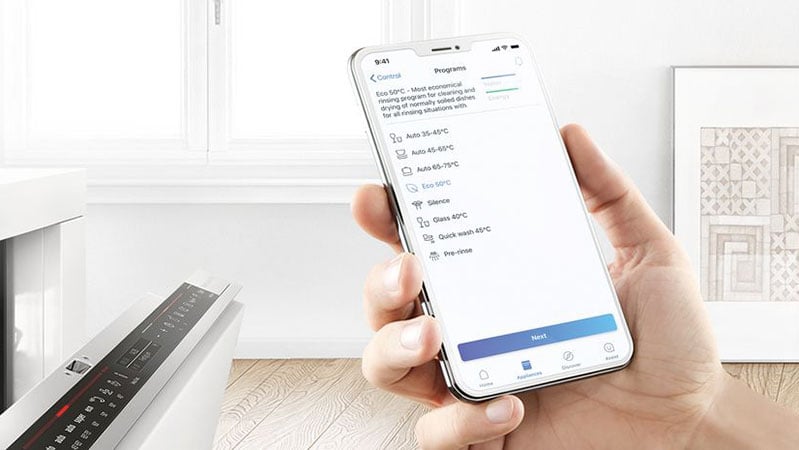
If you like tech or have other Bosch smart appliances, it’s handy. It’s also secure and stable enough that we rarely see issues.
But if you’re the “just press Start and walk away” type, you can skip it entirely.
What’s the Difference Between Bosch Overflow Protection and AquaStop?
Quick Answer: Overflow Protection shuts off water inside the tub, while AquaStop adds full leak sensors and a shutoff valve to protect your floors.
Overflow Protection (like on the Bosch 100 Series) is a basic safety float inside the tub. If too much water builds up, it shuts off the water inside the dishwasher.
It’s handy for clogs or overfilling but won’t catch a leak in a hose or valve.
AquaStop (on the 300 Series and up) is Bosch’s full leak prevention system.

It uses extra sensors in the base and a special double-walled hose with an automatic shut-off valve.
If water escapes anywhere, whether inside the tub or under your cabinets, AquaStop cuts the water at the source before it floods your floors.
💡 Pro Tip: AquaStop leak protection is smart insurance if you live in a tower at the Seaport or the third floor of a condo in the South End.
Nobody wants dishwasher water dripping through two floors of their neighbor’s ceiling.
Ready? Next, let’s see if the 100 Series makes sense for you.
Bosch 100 Series: Good Entry, Few Frills
Bosch SHVM4AYB3N
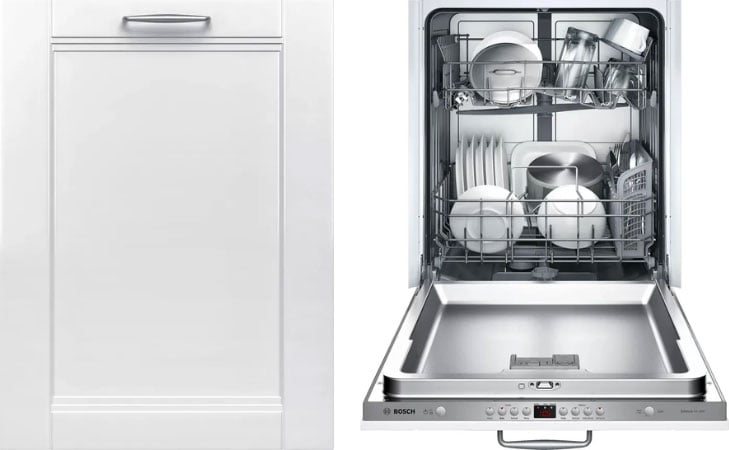
Bosch 100 Series 24" Panel Ready Built In Dishwasher
The Bosch 100 Series is your budget-friendly ticket into the Bosch lineup. It’s great if you want a trusted name without dropping four figures.
Just know you’re trading off some of the classic Bosch performance and quietness for that lower price tag.
Bosch 100 Series Key Features:
- Tub: Stainless steel sides with a plastic bottom. Stainless helps with heat and odor control. Plastic is fine but can hold smells over time.
- Noise Level: Runs at 46–50 decibels. For reference, 44 dB is the “quiet” sweet spot, so you’ll hear this one running if your kitchen opens to your living space.
- Cycles: You’ll get the basics: AutoWash (senses how dirty your dishes are), Normal, QuickWash, PowerScrub for baked-on messes, plus Eco mode to save water and power.
- Racking: Standard racks with basic adjustability. No RackMatic yet. Fitting tall pots might mean a little juggling.
- Drying: Uses condensation drying, which is just the heat and steam from the wash, a rinse aid like JetDry, and time. Works well on plates and glasses, but plastic lids might come out damp.
- Leak Protection: 24/7 overflow protection. Not fancy, but it does the job.
- Price Range: Expect $549–$699, depending on the style and handle.
What’s the Difference?
You’ll see the 100 split into Standard, 100 Plus, and 100 Premium. It’s pretty simple:
- Standard: Basic controls, lightest door.
- Plus: Slightly quieter (around 46 dB vs. 50 dB) and sometimes upgraded racks.
- Premium: A bit more sound insulation and minor style tweaks, including better handle finishes and a quieter door.
Performance is nearly the same. The upgrades are small improvements in noise and style.
Who It’s For:
If you’re updating a rental unit, outfitting a small Boston condo, or adding a second dishwasher for a basement bar or in-law suite, the 100 Series works.
It’s Bosch in name but without the classic Bosch quietness or drying power of the higher series.
💡Pro Tip: A quick cycle with a dishwasher cleaner—or even a splash of Tang—keeps that plastic base from picking up funky smells.
Other Dishwashers to Consider
- If you want something in the same price range, check LG for top reliability and steam cleaning.
- KitchenAid is another option if you prefer an American brand with a built-in heating element for drying.
Both are good choices but may run louder than Bosch.
Bosch 300 Series: The First Real Bosch
Bosch SGE53B55UC
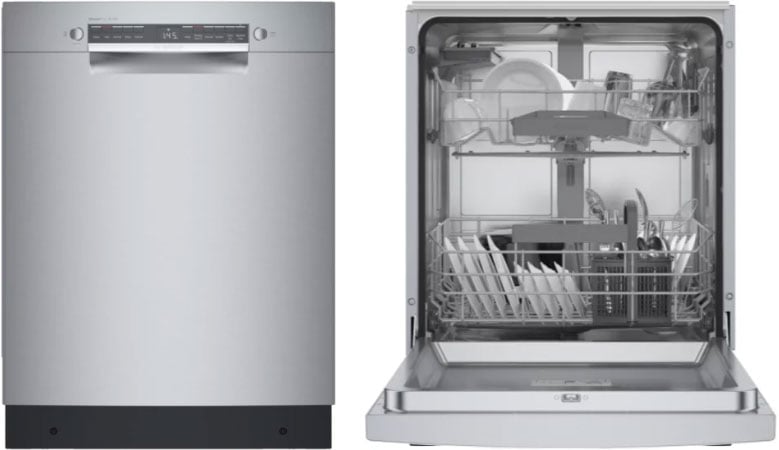
Bosch© 300 Series 24" Stainless Steel Built In Dishwasher
Bosch SGE53B52UC
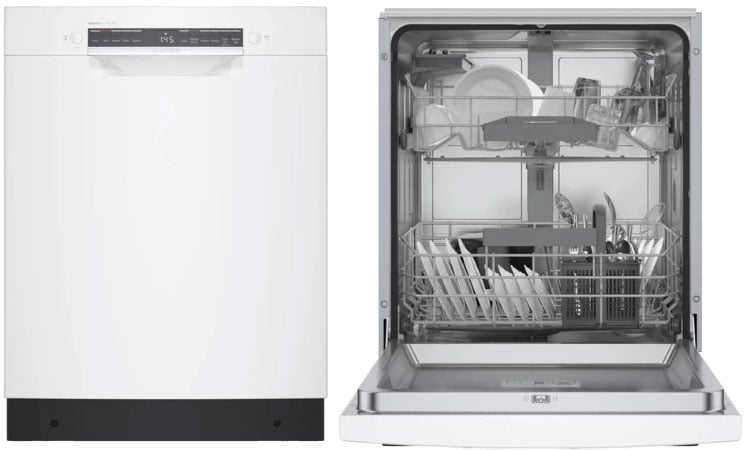
Bosch 300 Series 24" White Built In Dishwasher
Bosch SGE53B56UC
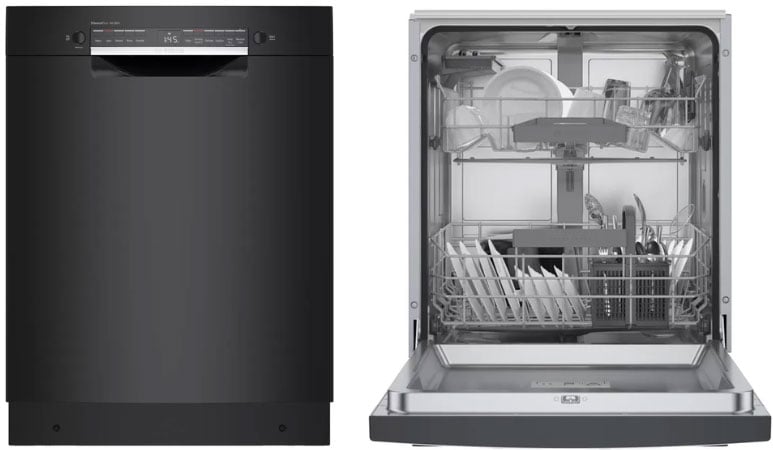
Bosch 300 Series 24" Black Built In Dishwasher
If the 100 Series is your starter model, the Bosch 300 Series is where you really see what Bosch is known for.
Expect a quieter wash, an all‑stainless tub, better racks, and more flexibility for real‑life cooking messes.
Bosch 300 Series Key Features:
- Tub: Fully stainless steel. It holds heat better, dries better, and won’t trap odors like plastic can.
- Noise Level: 46 decibels. Not silent, but noticeably quieter than the 100 Series. You’ll hear a soft hum, not a kitchen roar.
- Cycles: Adds more options, including Auto, Normal, Heavy, Express, Sanitize for baby bottles or cutting boards, and an Eco mode for lower energy use.
- Racking: The RackMatic system shows up here. This is Bosch’s adjustable upper rack that lets you raise or lower it to fit taller pots below or big wine glasses above. You also get a third rack for silverware, freeing up space on the bottom.
- Drying: Still uses condensation drying with heat, steam, JetDry, and time. You’ll see the same mild struggle with plastic lids.
- Leak Protection: Upgraded to AquaStop, a sensor system that shuts off the water if there’s a leak.
- Price Range: Typically $899 to $1,019, depending on finish.
Who It’s For:
The 300 is popular everywhere, from city condos to Cape remodels, because it’s the first classic Bosch. It’s fully stainless inside with RackMatic racks that make life easier.
💡Pro Tip: If you’re always washing wine glasses or oversized pans, you’ll appreciate the third rack and RackMatic adjustability more than you think.
Similar Dishwashers to Consider
- LG LDTH7972S ($999): This LG dishwasher uses steam to loosen tough stains and help dry glasses.
Bosch 500 Series: The Sweet Spot for Quiet and Drying
The Bosch 500 Series has been Yale’s most popular dishwasher line for years, and for good reason.
It’s noticeably quieter, has a better drying system, and keeps all the practical Bosch upgrades you want without jumping into luxury pricing.
Bosch 500 Series Key Features:
- Tub: Fully stainless steel, top to bottom. It offers better heat retention and helps with drying.
- Noise Level: 44 decibels. This is the sweet spot where you barely hear it running, even if your kitchen is open to your living room.
- Cycles: Builds on the 300 with more flexibility. Includes Auto, Heavy, Normal, Express, Delicate (gentler for fine dishes), Half Load for small runs, and Favorites so you can save your go-to settings.
- Racking: RackMatic adjustable upper rack, plus a handy third rack for silverware or spatulas.
- Drying: Adds AutoOpen Door. The door pops open slightly at the end of the cycle to release steam and reduce moisture clinging to your dishes. This helps plastics dry better than condensation alone.
- Leak Protection: AquaStop with smart leak sensors that shut off water if there’s a problem.
- Price Range: Usually $1,099 to $1,149, depending on handle style and finish.
Who It’s For:
If you cook a lot, love entertaining, or have an open-concept kitchen where noise matters, the 500 hits the sweet spot.
It’s quiet enough for your dinner party and dries better than the basic Bosch models without stepping up to the premium price tag.
Local Note: This dishwasher is popular everywhere from Wellesley to Wareham to Westerly. It’s quiet, reliable, and works day in and day out for families who run it every night.
💡Pro Tip: Run it at night. The AutoOpen pops the door, so your dishes are dry and ready for coffee mugs in the morning.
Similar Dishwashers to Consider
- Miele's G 5000 series has three full wash arms, plus their drying lets air inside the dishwasher. The colder air mixes with, the steamier air and is dissipated as water.
- KitchenAid's M series dishwashers have four-level wash action and large top racks.
Bosch 800 Series: Top Silence Ratingand Best Drying System
The Bosch 800 Series is where Bosch shows off its best everyday tricks.
It runs nearly silent, tackles stuck-on messes with its PowerControl spray arm, and finally dries your plastics so you’re not stuck wiping lids at midnight.
Bosch 800 Series Key Features:
- Tub: All stainless steel inside. Holds heat well and doesn’t trap odors.
- Noise Level: 42 decibels. So quiet you might open it by mistake while it’s still running.
- Cycles: Auto, Heavy, Normal, Express, Delicate, Half Load, Extra Dry, and the new PowerControl option for extra scrubbing power where you need it.
- PowerControl: The upgraded spray arm lets you boost water pressure in just part of the lower rack. That way, you can blast stuck-on casserole messes without over-spraying delicate dishes.
- Racking: RackMatic upper rack adjusts up or down to make room for tall items. The MyWay third rack is deeper than the standard version, so you can stack mugs and bowls, not just silverware.
- Drying: CrystalDry uses Zeolite, a natural volcanic mineral that absorbs moisture and releases heat to help dry even the trickiest plastic lids and containers.
- Leak Protection: AquaStop sensors shut off water if they detect a leak, so you don’t wake up to a puddle in your Seaport condo.
- Price Range: Usually around $1,349 to $1,499, depending on style and panel options.
Who It’s For:
This series is for anyone who’s done toweling off plastics.
It delivers premium quiet, smart cleaning zones, and Bosch’s best drying without the step up to Benchmark pricing.
💡Pro Tip: Use the app to dial up PowerControl for stuck-on pans and keep your wine glasses spotless in the same load.
One Thing to Know About PowerControl
- Available on: Bosch 800 and Benchmark Series only
- What it does: Boosts spray pressure on a specific zone of the lower rack to knock off stuck‑on food while sparing delicate glasses.
- How to use it:
- Connect the dishwasher to Wi‑Fi.
- Install the Bosch HomeConnect app.
- Select PowerControl from your phone before starting the cycle.
❗Important: There’s no physical button for PowerControl. No app = no PowerControl.
Similar Dishwashers to Consider
- If you’re shopping near the 800 Series price, Miele’s Crystal Series competes on drying performance and build quality.
- LG’s top models offer steam, fast cycles, and strong reliability.
- SKS, LG’s luxury spin-off, is an option if you want something unique with a one-hour wash and dry promise.
Just be sure service is easy to get where you live.
✅ See It for Yourself
You can see every Bosch model in person at any of our showrooms in Boston, Hanover, Framingham, Hyannis, Norton, or Nantucket.
Open the doors, test the racks, check the noise, and talk to someone who knows what breaks and what doesn’t.
Bosch Benchmark Series: Smoother Feel, Premium Touches
The Bosch Benchmark Series keeps everything you get in the 800 Series: an all‑stainless tub, CrystalDry for better plastic drying, a full cycle roster, PowerControl zone cleaning, and AquaStop leak protection.
It also adds smoother ball‑bearing racks, interior lights, and a more refined finish.
Bosch Benchmark Key Features
- Tub: Full stainless steel for better heat retention and odor control.
- Drying: CrystalDry with zeolite minerals. It’s Bosch’s best option for plastics.
- Noise: 38–40 dB (whisper‑quiet; you won’t notice a difference versus the 800).
- Racking: Ball‑bearing RackMatic rails, third rack, folding tines, wine‑glass supports.
- Targeted Cleaning: PowerControl zone spray via the HomeConnect app.
- Leak Protection: AquaStop sensors plus a double‑walled hose cut water at the source.
- Lighting: Two bright LEDs make loading and unloading at night easy.
- Smart: HomeConnect Wi‑Fi for remote start, cycle status, and diagnostics.
- Price: About $1,749–$1,999, depending on handle style or custom panel.
Why Choose Benchmark?
- Smoother, sturdier racks glide effortlessly even when fully loaded.
- Interior lights make midnight unloads painless.
- Refined finishes match high‑end kitchens without switching brands.
- Value check: The 800 Series delivers the same CrystalDry, cycles, and quietness for less; Benchmark adds premium feel and build.
Who It’s For
Homeowners who want Bosch’s best build quality, ultra‑smooth racks, and convenient lighting while still valuing reliability over flashy tech.
💡 Pro Tip: Visit a showroom and slide the Benchmark racks yourself; the upgraded feel is obvious within seconds.
Which Bosch Dishwasher Should You Buy?
Quick Answer: Buy the Bosch series that matches your lifestyle: 100 for budget basics, 300 for essentials, 500 for quiet drying, 800 for premium performance, and Benchmark for a luxury feel.
Bosch dishwashers run quiet, clean well, and if you choose the right one, your plastic containers will come out dry without you wiping them at midnight.
Here’s the quick recap:
- 100 Series: A good entry if you want the Bosch name at the lowest price. Works fine for rentals or second kitchens, but you give up the classic Bosch quietness and better racks.
- 300 Series: The first true Bosch feel with an all-stainless tub and the RackMatic adjustable rack. Quieter than the 100 and popular for busy families and everyday cooks.
- 500 Series: The sweet spot for most people. Quiet enough for an open kitchen with improved drying thanks to AutoOpen.
- 800 Series: Quieter still, with PowerControl cleaning zones, CrystalDry to dry plastics properly, and the deeper MyWay third rack for mugs and bowls. The best all-around performance without paying the Benchmark premium.
- Benchmark: Same cleaning, drying, and quietness as the 800. The difference is smoother, premium racks with ball-bearing rails, interior lights, and a slightly upgraded finish. It’s for buyers who want the best feel and polish Bosch offers.
If you want to skip the rewashing, enjoy a quiet run, and hate toweling off plastic lids every night, Bosch is worth a look.
Just match the series to how you cook and how much noise you want to hear.
Next Step
If you’re still comparing options, grab our free Dishwasher Buying Guide.
It covers Bosch, Miele, KitchenAid, LG, and more, plus honest local reliability stats you won’t find on a brand website.
Or stop by one of our showrooms in Boston, Hanover, Framingham, Hyannis, Norton, or Nantucket. Open the doors, test the racks, and hear what quiet really sounds like.
And if you do choose Bosch or any brand, you’ll have Yale behind you for installation, real local service, and support when you need it.
FAQs
Answers to the most commonly asked questions about Bosch dishwashers.
How long does a Bosch dishwasher cycle take?
The duration of a Bosch dishwasher cycle depends on the selected cycle and options. On average, a normal cycle may take around 2-3 hours, while shorter cycles such as Express or Quick Wash can complete in approximately 30 minutes to 1 hour. Some Bosch dishwashers also offer a Speed60 cycle that completes a full wash and dry cycle in about 60 minutes.
How much water does a Bosch dishwasher use?
Bosch dishwashers are designed to be water efficient. The exact water usage may vary depending on the model and cycle selected, but on average, Bosch dishwashers use around 2-4 gallons (7.5-15 liters) of water per cycle. The specific water usage can be found in your dishwasher's product specifications or user manual.
How can I improve the energy efficiency of my Bosch dishwasher?
To enhance the energy efficiency of your Bosch dishwasher, you can follow these tips: fully load the dishwasher for each cycle, use the dishwasher's Eco mode when appropriate, scrape off excess food rather than pre-rinsing dishes, use the dishwasher's delay start feature to run cycles during off-peak hours and ensure the dishwasher is properly maintained by cleaning the filters and regularly checking for any blockages.
Can I use regular dish soap in a Bosch dishwasher?
No, regular dish soap should not be used in a Bosch dishwasher. Bosch dishwashers are specifically designed to work with dishwasher detergent. Regular dish soap creates excessive suds that can overflow and damage the dishwasher. Always use dishwasher-specific detergent for optimal cleaning results.
Can I wash non-dishware items in my Bosch dishwasher?
Bosch dishwashers are designed for cleaning dishes, glassware, and utensils. Washing non-dishware items such as shoes, toys, or electronics in the dishwasher is not recommended, as they may get damaged or damage the dishwasher. Refer to the user manual for a list of items suitable for dishwasher cleaning.
How do I clean my Bosch dishwasher?
Bosch recommends regularly cleaning the dishwasher's filter, spray arms, and interior to maintain optimal performance. Use a soft cloth or sponge with mild detergent to clean the interior and wipe down the exterior with a damp cloth. Refer to the user manual for detailed cleaning instructions.
Why is my Bosch dishwasher not drying dishes properly?
Several factors can affect the drying performance of a dishwasher. Ensure the Rinse Aid dispenser is filled, select the appropriate drying option, and use a high-quality rinse aid. Also, ensure that plastic items are placed securely and not blocking the dishwasher's vents.
How can I resolve a Bosch dishwasher that is not draining?
If your dishwasher is not draining, check for clogs in the drain hose, garbage disposal, or air gap. Make sure the dishwasher's filter is clean and properly installed. Running a dishwasher cleaner or vinegar through a cycle might also help remove blockages. If the issue persists, consult the user manual or contact Bosch customer support.
How can I fix a Bosch dishwasher that is not starting?
First, check if the dishwasher is properly connected to the power source and the door is securely closed. Ensure that the control panel is not locked by holding down the "Start" button for a few seconds. If the issue persists, try resetting the dishwasher by turning off the power supply for a few minutes and then turning it back on.
Why is my Bosch dishwasher making unusual noises?
It is normal for a dishwasher to make some noise during operation, but loud or unusual noises may indicate an issue. Check if any items are obstructing the spray arms or if dishes are improperly loaded. Make sure the dishwasher is level and securely installed.
How can I troubleshoot error codes on my Bosch dishwasher?
If your Bosch dishwasher displays an error code, consult the user manual for a list of error codes and their corresponding troubleshooting steps. Error codes can indicate various issues, such as water supply problems, drainage issues, or malfunctions in specific components.
Compare the Best Dishwashers in One Guide
Not sure which model is right for your home?
Download our updated Dishwasher Buying Guide packed with reliability rankings, drying performance insights, and real-world test results from over 30,000 service calls.
Trusted by over 1 million homeowners.
Related Articles:
Why Should You Trust Us?
It seems that every appliance review has nothing but glowing comments about almost every product, yet you read customer reviews and they are almost universally bad.
We are here to fill in the disconnect. We'll give you the best features, and the drawbacks as well, including reliability based on over 37,000 calls performed by our service team just last year. Our goal is to give you ALL the information so you know what's right for you.
Please consider subscribing or adding to the conversation in the comments below. We appreciate you stopping by.
Steve Sheinkopf is the third-generation CEO of Yale Appliance and a lifelong Bostonian. He has over 38 years of experience in the appliance industry, and he is a trusted source of information for consumers on how to buy and repair appliances.
Steve has also been featured in numerous publications, including the
New York Times,
Consumer Reports,
The Boston Globe,
Bloomberg Radio, the
New York Post,
The Wall Street Journal, and
Entrepreneur, for his knowledge of how to buy appliances and appliance repair.
Steve is passionate about helping consumers find the best appliances for their needs, and he is always happy to answer questions and provide advice. He is a valuable resource for consumers who are looking for information on appliance buying, repair, and maintenance.
Despite being the worst goalie in history, Steve is a fan of the Bruins and college hockey, loves to read, and is a Peloton biker. The love of his life is his daughter, Sophie.
A Note About Pricing
Pricing on this blog is for reference only and may include time sensitive rebates. We make every attempt to provide accurate pricing at time of publishing. Please call the stores for most accurate price.
Topics:


